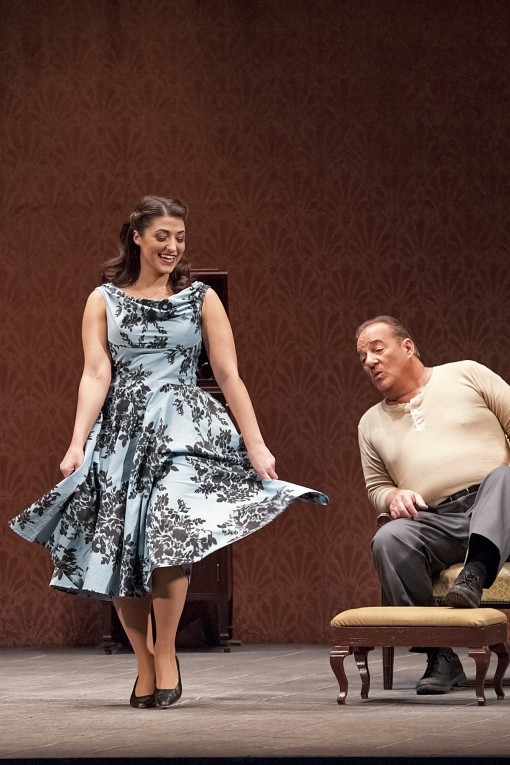Father-daughter team shines in Detroit revival of Bolcom’s “A View from the Bridge”

Kiri Deonarine and Kim Josephson in Michigan Opera Theater’s production of William Bolcom’s “A View from the Bridge.” Photo: John Grigaitis.
“I ain’t her father,” says the rough Brooklyn dock worker Eddie Carbone about his beloved niece Catherine. “I’m only her uncle!”
Well, Saturday night in Michigan Opera Theater’s revival of William Bolcom’s A View from the Bridge, Eddie really was Catherine’s father. Kim Josephson, who created the role of Eddie Carbone, shared the stage with his daughter, soprano Kiri Deonarine, who is enjoying a burgeoning career of her own.
In an economically straitened era, when major American opera houses are largely shunning our own operatic legacy, give all credit to David DiChiera, MOT’s founder and guiding light for programming Bolcom’s opera.
Based upon the Arthur Miller play of the same name, the opera tells of the longshoreman Eddie who agrees to take in two Italian cousins of his wife Beatrice, who are illegal aliens, or, in the parlance of the play, “submarines.” Eddie is overprotective of his niece to an unhealthy degree, cautioning her about “walking wavy” and telling her not to trust people. Conflict ensues when Catherine falls for the handsome younger brother Rodolfo, and the jealous Eddie convinces himself that the young man is somehow “not right”—though in a drunken state, when he passionately kisses his niece and Rodolfo, it’s clear that Eddie has some unresolved issues of his own. When the agitated Eddie turns the brothers in to the authorities, he is shunned by his friends and the entire neighborhood turns on him. The dangerous older brother Marco is released from prison and hunts for Eddie, leading to the opera’s tragic coda.
Bolcom’s opera garnered rave reviews in its 1999 premiere at the Lyric Opera of Chicago and has become one of the most popular of contemporary operas, with productions at the Met and around the world. The composer’s tight focus on the drama and characters makes for a compelling evening of theater and Bolcom’s score is among his finest works: wonderfully eclectic, tonal yet with pungently chromatic moments and edgy scoring. A View from the Bridge also offers the most indelible aria of the last quarter-century in Rodolfo’s ode to his new city, “New York Lights.”
At the premiere, some critics complained about the didactic narrative of the lawyer Alfieri and the interjections of the ensemble as Greek (actually Italian-American) chorus, but those elements now seem piquant and work nicely to add tension. The repeated “Yeah!” of Eddie’s friend Mike remains more annoying than funny. And I still feel that Eddie needs a final aria or some kind of musical moment at the end of the opera to give his death greater tragic resonance.
But A View from the Bridge remains one of the finest of all American operas and was well served by MOT’s superb production.
With his gruff baritone and working-class countenance, Kim Josephson was born to play the role of Eddie. His voice is, inevitably, less robust than when he created the role in Chicago a decade and a half ago, but Eddie is more a dramatic assignment than a sing anyway. His long experience in multiple revivals of the role he created was manifest, and Josephson’s towering portrayal makes Eddie a figure of Shakespearean stature. The baritone personified the tough yet good-hearted man done in by pride, conflicted desires and a crucial lack of self-knowledge. Josephson sounded a bit light-voiced early in the evening but rose to the dramatic moments with fire and searing intensity, his half-crazed demands to Marco “Give me back my name!” sealing his fate.
Kiri Deonarine was equally inspired as Catherine. In addition to providing a wonderfully natural give-and-take with Josephson’s Eddie in the domestic scenes, Deonarine sang with a pure-toned soprano and created a fully realized character: girlish in the early going, gazing with big-eyed adoration at Rodolfo as he sings “Paper Doll,” and bringing strength when Catherine finally stands up to the bullying Eddie.
Eric Margiore has the good looks and high notes for Rodolfo, his poised and elegant rendition of “New York Lights”—with a gorgeous soft high final note—making it the evening’s breakout musical moment as intended. Dramatically he was solid if a bit stiff and monochrome, and his performance would benefit from more varied facial expressiveness and depth of character.
Jonathan Lasch didn’t quite possess the lurking menace or vocal depths necessary for Marco but brought a weighty baritone to his aria, “A ship called Hunger.” Beverly O’Regan-Thiele was a light-voiced, at times inaudible Beatrice, while Ricardo Lugo displayed a sonorous bass as Alfieri. As Eddie’s buddies Louis, Mike and Tony, John Arnold, David Moan and Brian Leduc filled out the cast solidly.
The drunken confrontation scene seemed like a work in progress opening night, but otherwise director Tazewell Thompson’s fluent blocking and direction let the action unfold naturally. The Indiana University production was simple yet effective with Robert O’Hearn’s period costumes, descending brownstone facade and domestic parlor interior enhanced by Kendall Smith’s artful lighting
The chorus sang with imposing strength and polish under chorus master Suzanne Mallare Acton. As conductor, Acton was more of a mixed bag. She led the performance capably yet too often with an unsubtle and metrical hand, sliding over scoring details, and failing to bring nuance and flexibility to the key moments.
Before the performance, the leadership baton was passed by DiChiera to Michigan Opera Theater’s new general director Wayne S. Brown. DiChiera will remain at the company he founded 43 years ago as artistic director.
A View from the Bridge runs through April 13 at the Detroit Opera House. Michiganopera.org